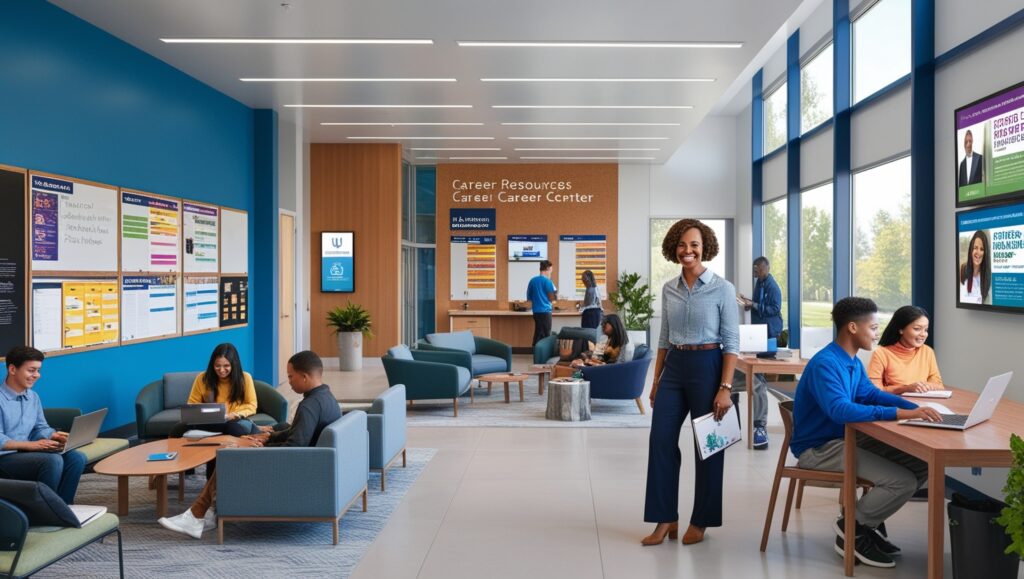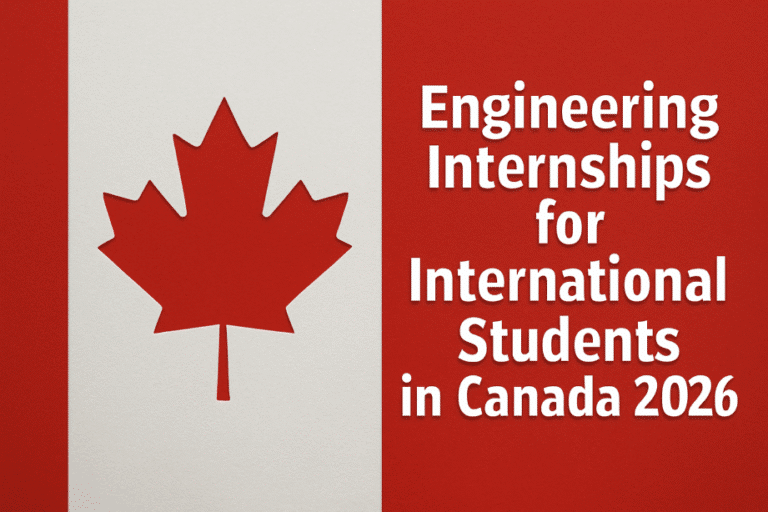University Career Centers: Finding Internship Opportunities for Students and Recent Grads
Internships have become a crucial stepping stone for students and recent graduates to gain practical experience, build professional networks, and enhance their employability. These opportunities serve as a bridge between academic learning and real-world application, allowing individuals to explore potential career paths and develop essential skills sought by employers.
University career centers play a pivotal role in connecting students and alumni with internship opportunities. These centers act as a valuable resource, offering guidance, tools, and connections to help navigate the often complex process of securing meaningful internships. By leveraging the services provided by career centers, students can significantly increase their chances of finding internships that align with their academic interests and career aspirations.
Further Readings
- Job Boards and Websites for Internship Opportunities Around The Globe
- Career Fairs for Internship Opportunities

Understanding University Career Centers
Purpose and Functions
University career centers serve as a centralized hub for career development and job search assistance. Their primary purpose is to support students and alumni in their professional journey, from exploring career options to securing internships and full-time employment. Career centers aim to bridge the gap between academic education and the professional world, equipping students with the necessary skills and resources to succeed in their chosen fields.
Services Offered
Career centers typically offer a wide range of services tailored to meet the diverse needs of students and recent graduates. These services often include:
- Career Counseling: One-on-one sessions with trained professionals to discuss career goals, explore options, and develop personalized strategies.
- Resume and Cover Letter Review: Expert feedback and assistance in crafting compelling application materials.
- Mock Interviews: Practice sessions to hone interview skills and build confidence.
- Job and Internship Databases: Access to exclusive listings and opportunities.
- Networking Events: Organized meetups with industry professionals and alumni.
- Career Workshops: Skill-building sessions on topics such as personal branding, salary negotiation, and professional etiquette.
- Employer Information Sessions: Opportunities to learn about specific companies and industries directly from recruiters.
Staff and Resources Available
University career centers are typically staffed by a team of experienced professionals, including:
- Career Counselors: Specialists who provide individualized guidance and support.
- Employer Relations Coordinators: Professionals who maintain relationships with companies and organizations to secure internship and job opportunities.
- Alumni Career Advisors: Experts who focus on supporting recent graduates and alumni in their ongoing career development.
In addition to human resources, career centers often provide access to valuable tools and platforms, such as:
- Online Assessment Tools: Personality tests and skills assessments to help students identify suitable career paths.
- Virtual Interview Platforms: Software for conducting and recording practice interviews.
- Career Exploration Resources: Databases and guides on various industries and job roles.
- Professional Development Libraries: Collections of books, magazines, and digital resources on career-related topics.
How Career Centers Help with Internship Searches

Job Boards and Databases
University career centers typically maintain extensive job boards and internship databases, often featuring exclusive opportunities not available on public platforms. These resources are usually tailored to the institution’s academic programs and student profiles, making it easier for students to find relevant opportunities. Many career centers utilize advanced software systems that allow students to create personalized profiles, set up job alerts, and apply directly through the platform.
Career Fairs and Networking Events
Career centers organize regular career fairs and networking events, bringing employers directly to campus or facilitating virtual interactions. These events provide invaluable opportunities for students to engage with potential employers, learn about internship openings, and make lasting impressions. According to the National Association of Colleges and Employers (NACE), 70.4% of employers rated career fairs as an effective recruiting method in 2021, underscoring their importance in the internship search process.
Resume and Cover Letter Assistance
Crafting compelling application materials is crucial for securing internships. Career centers offer expert guidance in developing resumes and cover letters that highlight students’ strengths and align with industry standards. This service often includes one-on-one review sessions, workshops, and access to templates and resources. Career center staff are typically well-versed in current trends and employer preferences, ensuring that students’ application materials are competitive and effective.
Interview Preparation
To help students succeed in the interview process, career centers provide comprehensive interview preparation services. These may include mock interview sessions with feedback, workshops on common interview questions and techniques, and guidance on professional etiquette. Many centers also offer resources on various interview formats, including behavioral, case, and technical interviews, ensuring students are prepared for diverse interviewing scenarios.
Career Counseling and Advice
Career counselors play a crucial role in guiding students through the internship search process. They offer personalized advice on career paths, help students identify their strengths and interests, and provide strategies for targeting specific industries or roles. This individualized approach can be particularly beneficial for students who are unsure about their career direction or need help navigating the complexities of the job market.
Maximizing the Use of Career Center Resources
Creating a Strong Profile
To make the most of career center resources, students should start by creating a comprehensive profile on the center’s job board or database. This profile should include:
- An up-to-date resume
- Academic achievements and relevant coursework
- Skills and extracurricular activities
- Career interests and preferences
A well-crafted profile enables career center staff to better match students with suitable opportunities and allows employers to find potential candidates more easily.
Utilizing Online Platforms Effectively
Many career centers offer access to sophisticated online platforms for job searching, skill development, and networking. To maximize these resources:
- Set up job alerts for relevant internship opportunities
- Regularly update your profile and resume
- Engage with virtual career fairs and employer information sessions
- Use skill assessment tools to identify areas for improvement
Consistently engaging with these platforms increases the likelihood of finding and securing internship opportunities.
Attending Workshops and Seminars
Career centers frequently host workshops and seminars on various career-related topics. These events offer valuable insights into industry trends, job search strategies, and professional development. Students should:
- Regularly check the career center’s event calendar
- Attend sessions relevant to their career interests
- Actively participate and ask questions
- Apply the knowledge gained to their internship search
According to a study by the Collegiate Employment Research Institute of the Michigan State University, students who participate in four or more career workshops are 13% more likely to receive a job offer than those who do not participate.
Building Relationships with Career Center Staff
Developing strong relationships with career center staff can provide numerous benefits:
- Personalized guidance and support
- Access to insider information about internship opportunities
- Potential referrals to employers or alumni
- Ongoing mentorship throughout the job search process
Students should schedule regular check-ins with career counselors, attend office hours, and actively seek advice to cultivate these valuable relationships.
Types of Internship Opportunities

Local Internships
Local internships offer students the chance to gain professional experience within their immediate geographical area. These opportunities often provide easier logistics for students still balancing academic commitments. Local internships can be particularly valuable for building professional networks within the community and may lead to full-time employment opportunities post-graduation. Many universities have strong relationships with local businesses and organizations, facilitating a steady stream of internship opportunities for their students.
National Internships
National internships expand the scope of opportunities beyond the local area, often offering experiences with larger corporations, government agencies, or renowned organizations in major cities. These internships can provide exposure to diverse business environments and industry practices. While they may require relocation or long-distance commuting, national internships often come with more competitive compensation packages and can significantly enhance a student’s resume.
International Internships
International internships offer a unique blend of professional and cultural experiences. These opportunities allow students to develop global perspectives, enhance language skills, and demonstrate adaptability to potential employers. According to a study by the Institute of International Education, students who intern abroad are 20% more likely to secure senior leadership roles early in their careers. However, international internships often require more extensive planning, including visa arrangements and accommodation considerations.
Virtual Internships
The rise of remote work has led to an increase in virtual internship offerings. These opportunities allow students to gain professional experience from anywhere, eliminating geographical barriers and reducing costs associated with relocation or commuting. Virtual internships can be particularly beneficial for students with other commitments or those seeking flexibility. They also prepare students for the increasingly digital nature of many workplaces.
Strategies for Finding Internships Near and Far
Researching Companies and Industries
Effective internship searches begin with thorough research into potential companies and industries. Students should:
- Identify key players in their fields of interest
- Study industry trends and challenges
- Understand the typical roles and responsibilities offered in internships
- Research company cultures and values to ensure alignment with personal goals
Utilize resources like industry publications, company websites, and professional associations to gather comprehensive information. The Occupational Outlook Handbook by the U.S. Bureau of Labor Statistics can provide valuable insights into various industries and career paths.
Leveraging Alumni Networks
University alumni networks are powerful resources for internship seekers. Many successful professionals are eager to support students from their alma mater. To leverage these connections:
- Attend alumni networking events organized by the career center
- Use the university’s alumni database or LinkedIn alumni tool to identify potential contacts
- Reach out for informational interviews or advice on breaking into specific industries
- Join alumni groups on professional networking platforms
A study by the National Association of Colleges and Employers found that 36.7% of employers consider employee referrals as one of the most effective recruiting methods, highlighting the importance of networking.
Using Social Media and Professional Networking Sites
Social media and professional networking sites have become invaluable tools for internship searches. Students should:
- Maintain a professional and up-to-date LinkedIn profile
- Follow companies of interest on various social media platforms
- Join industry-specific groups and engage in discussions
- Use platform-specific job search features, such as LinkedIn Jobs or X’s job search function
According to a 2021 report by Jobvite, 92% of recruiters use social media in their recruitment efforts, making a strong online presence crucial for internship seekers.
Exploring Government and Non-Profit Opportunities
Government agencies and non-profit organizations offer unique internship experiences that can be highly rewarding and provide valuable public service experience. These opportunities often come with the added benefit of potential loan forgiveness programs for those pursuing careers in public service. Resources like USAJobs.gov for federal internships or Idealist.org for non-profit opportunities can be excellent starting points for exploring these sectors.
Tips for Securing Internships Through Career Centers

Start Early and Plan Ahead
Securing desirable internships often requires advance planning. Many competitive programs have application deadlines several months before the internship start date. To maximize opportunities:
- Begin researching internships at least a semester before you intend to start
- Create a timeline of application deadlines and requirements
- Schedule appointments with career counselors early to discuss your goals and strategy
- Attend information sessions and career fairs at the beginning of the academic year
According to the National Association of Colleges and Employers (NACE), 55.4% of employers begin recruiting interns in the fall for summer positions, emphasizing the importance of early preparation.
Tailor Applications to Specific Opportunities
Generic applications rarely stand out in a competitive internship market. To increase your chances of success:
- Customize your resume and cover letter for each application, highlighting relevant skills and experiences
- Research the company thoroughly and demonstrate your knowledge in your application materials
- Use keywords from the internship description in your application to pass applicant tracking systems (ATS)
- Provide specific examples of how your skills and experiences align with the internship requirements
A study by Ladder found that tailored resumes are 61% more likely to result in an interview compared to generic ones.
Follow Up on Applications and Leads
Proactive follow-up can set you apart from other candidates:
- Send a polite email inquiry if you haven’t heard back within the specified timeframe
- After interviews, send personalized thank-you notes within 24-48 hours
- Maintain contact with networking connections, updating them on your search progress
- If not selected, ask for feedback to improve future applications
Remember, persistence demonstrates genuine interest and can sometimes lead to alternative opportunities.
Be Open to Different Types of Internships
While it’s important to have career goals, being flexible can open up valuable opportunities:
- Consider internships in related fields that can provide transferable skills
- Be open to smaller companies or startups, which may offer more hands-on experience
- Explore virtual internships if location is a limiting factor
- Consider unpaid internships for the experience, but be aware of your rights under labor laws
A diverse range of experiences can make you a more well-rounded candidate for future opportunities.
Overcoming Common Challenges
Limited Opportunities in Specific Fields
Some industries or specializations may have fewer internship opportunities. To overcome this:
- Broaden your search to include related fields or positions
- Create your own internship by proposing a project to a company of interest
- Consider gaining experience through volunteer work or part-time jobs in the field
- Develop relevant skills through online courses or certifications
The key is to be creative in finding ways to gain experience and demonstrate your commitment to your chosen field.
Competition for Popular Internships
High-profile internships often attract a large number of applicants. To stand out:
- Develop a unique personal brand that showcases your strengths and passion
- Seek opportunities to gain relevant experience through campus projects or clubs
- Cultivate strong relationships with professors who can provide stellar recommendations
- Consider less competitive entry points into desirable companies, such as rotational programs or less popular departments
Remember, sometimes the less obvious path can lead to equally valuable experiences and future opportunities.
Balancing Internship Search with Academic Responsibilities
Juggling academics with an intensive internship search can be challenging. To maintain balance:
- Create a structured schedule that allocates time for both academics and internship applications
- Use productivity tools to manage deadlines and tasks efficiently
- Prioritize applications based on deadlines and your level of interest in the opportunity
- Don’t hesitate to seek support from academic advisors or career counselors if you’re feeling overwhelmed
A study by Michigan State University found that students who effectively balance academics with career preparation activities tend to have better post-graduation outcomes.
Dealing with Rejection and Maintaining Motivation
Rejection is a normal part of the internship search process. To stay motivated:
- View rejections as learning opportunities and seek feedback when possible
- Set small, achievable goals to maintain a sense of progress
- Celebrate small wins, such as securing an interview or improving your application materials
- Stay connected with peers and mentors for support and encouragement
Remember, many successful professionals faced rejections early in their careers. Persistence and resilience are key to long-term success.
Making the Most of Your Internship Experience

Setting Goals and Objectives
To maximize the value of your internship, it’s crucial to establish clear goals and objectives:
- Meet with your supervisor at the beginning of the internship to discuss expectations and potential projects
- Develop SMART (Specific, Measurable, Achievable, Relevant, Time-bound) goals for your internship period
- Regularly review and adjust your goals as you progress through the internship
- Seek feedback on your performance and areas for improvement
A study by the University of Wisconsin-Madison found that interns who set clear goals reported higher satisfaction and learning outcomes from their experiences.
Building Professional Relationships
Networking is a critical component of a successful internship:
- Engage with colleagues across different departments to gain a broader understanding of the organization
- Seek out a mentor within the company who can provide guidance and support
- Attend company events and participate in social activities to build rapport with team members
- Maintain professional behavior and communication at all times
According to a survey by LinkedIn, 85% of jobs are filled through networking, underscoring the importance of building strong professional relationships during your internship.
Documenting Achievements and Skills Gained
Keep a detailed record of your internship experience:
- Maintain a daily or weekly journal of tasks, projects, and accomplishments
- Collect tangible examples of your work, such as reports or presentations (ensuring you have permission to do so)
- Note specific skills you’ve developed or improved during the internship
- Request a letter of recommendation or LinkedIn endorsement from your supervisor
Turning Internships into Full-Time Job Opportunities
Many companies use internships as a pipeline for full-time hires. To increase your chances of converting your internship:
- Express your interest in full-time opportunities early on
- Take on additional responsibilities and projects when possible
- Build relationships with decision-makers in the organization
- Stay in touch with your colleagues and supervisors after the internship ends
Beyond Graduation: Career Center Support for Recent Alumni
Continued Access to Resources
Many university career centers extend their services to recent graduates:
- Job boards and databases often remain accessible for a period after graduation
- Career counseling services may be available to alumni for a specified time
- Online resources and tools typically continue to be accessible through alumni accounts
- Some universities offer lifetime career support to their graduates
Alumni-Specific Services and Events
Career centers often tailor services to meet the unique needs of recent graduates:
- Alumni-focused job fairs and networking events
- Workshops on transitioning from college to career
- Webinars featuring successful alumni sharing career insights
- One-on-one career coaching sessions for alumni
Lifelong Career Development Support
Many universities view career support as a lifelong commitment to their graduates:
- Access to career change resources and mid-career counseling
- Opportunities to connect with current students as a mentor or industry expert
- Invitations to participate in alumni panels and career events
- Continuous learning opportunities through alumni education programs
The transition from student to professional can be challenging, but leveraging the ongoing support of your university’s career center can significantly ease this process. By maintaining a connection with your alma mater and taking advantage of alumni services, you can continue to benefit from career guidance and networking opportunities throughout your professional journey.
Conclusion
Recap of the Importance of University Career Centers
University career centers play a vital role in bridging the gap between academic learning and professional success. These centers offer a comprehensive suite of services that are invaluable for students and recent graduates seeking internships and launching their careers. From providing access to exclusive job boards and internship databases to offering personalized career counseling and interview preparation, career centers equip students with the tools and knowledge necessary to navigate the competitive job market successfully.
The benefits of utilizing career center resources extend far beyond securing an initial internship. These centers foster the development of essential career management skills that serve individuals throughout their professional lives. By teaching students how to effectively search for opportunities, craft compelling applications, and build professional networks, career centers lay the foundation for long-term career success.
Encouragement to Take Full Advantage of Available Resources
To maximize the benefits of university career centers, students and recent graduates should:
- Engage early and often: Don’t wait until your final semester to visit the career center. Start building relationships with career counselors and exploring resources as early as possible in your academic journey.
- Be Proactive: Take initiative in seeking out opportunities, attending events, and utilizing the full range of services offered by your career center.
- Stay Open-minded: Be receptive to diverse opportunities and advice that may not align with your initial career plans. Some of the most rewarding career paths are those we least expect.
- Maintain Connections: Even after graduation, continue to leverage your university’s alumni services and stay connected with the career center for ongoing support and networking opportunities.
- Pay it forward: As you progress in your career, consider giving back by participating in alumni panels, offering internships, or mentoring current students.
As you embark on your internship search and career journey, view your university career center as a trusted partner and invaluable resource. The guidance, tools, and connections it provides can be the catalyst for turning your career aspirations into reality. Take the first step today by scheduling an appointment with your career center and begin unlocking the doors to your professional future.











One Comment